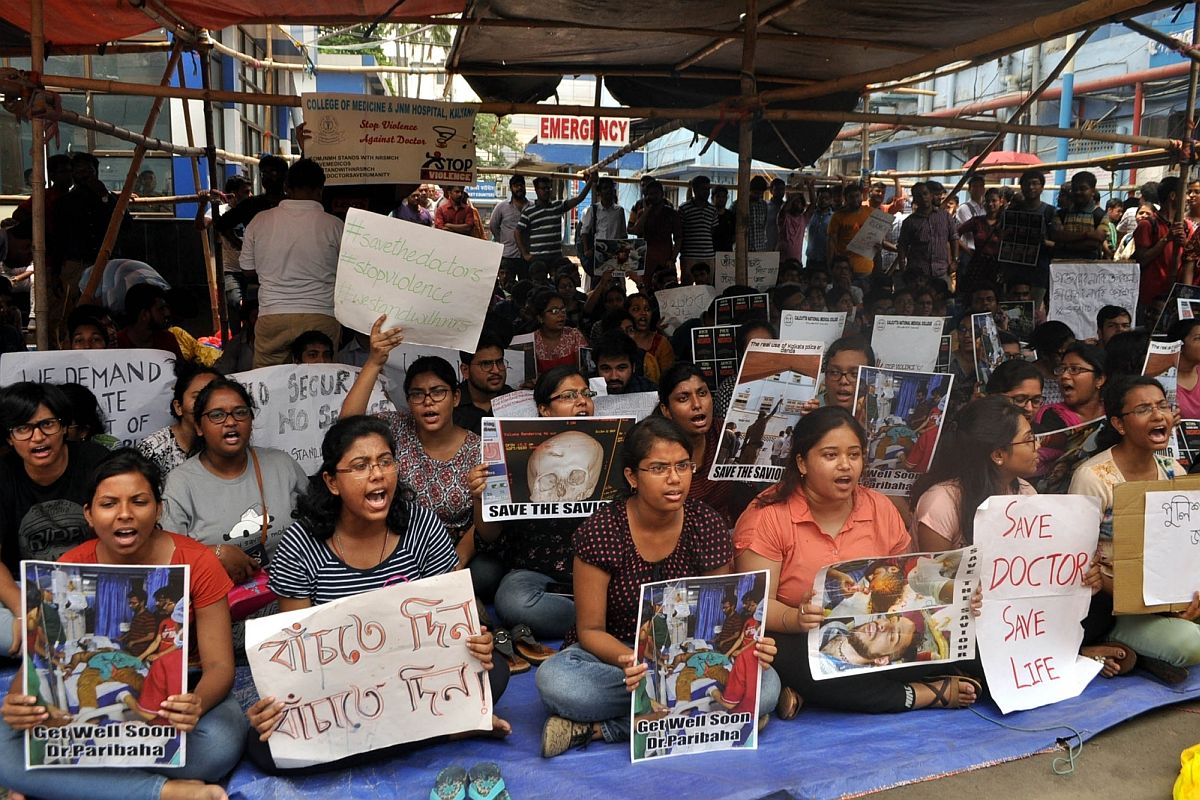TMC blames BJP for explosion, violence
Violence erupted again at Rejinagar in Murshidabad district on Wednesday evening, injuring around 20 people.
The development comes after a 73-year-old doctor of a tea estate in Assam’s Jorhat district succumbed to his injuries after being allegedly assaulted by a mob of 250 garden workers.

Juniors doctors of NRS Medical College and Hospital in West Bengal protesting attack on a colleague. (File Photo: IANS)
After numerous incidents of violence against doctors, the Centre has proposed legislation that makes assault of medical professionals a criminal offence with imprisonment up to 10 years and fine extending up to Rs 5 lakh.
The Ministry of Health and Family Welfare has framed the Healthcare Service Personnel and Clinical Establishments (Prohibition of Violence and Damage to Property) Bill 2019 which aims at prohibiting violence against doctors and other healthcare professionals.
The draft bill says those commissioning violence or causing damage to the property of a healthcare facility can be imprisoned for six months to five years and fined between Rs 50,000 and Rs five lakh.
Advertisement
Those “grievously hurting” doctors and other healthcare professionals in clinical establishments may face imprisonment between three and ten years and could be fined between Rs 2 to Rs 10 lakh
“It has been decided to solicit objections and suggestions from public with regard to said draft legislation before the finalisation of the draft Bill,” the ministry said.
The objections/suggestions may be forwarded within 30 days from the date of issue of this notice.
Healthcare professionals include doctors and para-medical staff and also medical students, diagnostic service providers in a health facility and ambulance drivers.
The draft bill also provisions for compensation which could be twice the market value of a property damaged and Rs 1 lakh to Rs 5 lakh for being assaulted or hurt, sources said.
In case of non-payment of compensation by a convict, the amount may be recovered as arrears of land revenue under the Revenue Recovery Act 1890.
The development comes after a 73-year-old doctor of a tea estate in Assam’s Jorhat district succumbed to his injuries after being allegedly assaulted by a mob of 250 garden workers following the death of one of their colleagues who was undergoing treatment at a hospital in the plantation.
The incident occurred at Teok tea estate on Saturday.
The tea garden workers had gheraoed the hospital and Dr Deven Dutta had to be rescued by the police. He was shifted to Jorhat Medical College and Hospital where he died while undergoing treatment.
According to reports, 21 people have been arrested in connection with the case.
The Indian Medical Association has called a strike, including withdrawal of emergency services, today. The doctors in Assam have also called for a 24-hour ‘withdrawal of medical services excluding emergency’ across the state today in protest against the gruesome act.
Doctors on several occasions went on an indefinite strike all over India as they were assaulted and attacked by family members of the patients. In Delhi last week two resident doctors at Safdarjung Hospital were thrashed by attendants of a family member who had passed away at the hospital.
Earlier in June, scores of doctors across the country including the national capital decided to stop work and strike for a day in protest against attack on a medical intern in West Bengal.
Pariboho Mukherjee, a doctor, suffered serious injuries to his skull when relatives of a 75-year-old patient, Mohammed Shahid, clashed with doctors alleging that the patient died because of negligence.
The Health Ministry had entrusted an eight-member sub-committee, comprising its officials and representatives from the Medical Council of India, Indian Medical Association, the All India Institute of Medical Sciences’ Resident Doctors Association and an experienced person from the Bureau of Police Research and Development, with the task of drafting the bill.
The sub-committee was constituted after a 10-member panel set up by the Health Ministry looked into the “pros and cons” of bringing such a central legislation.
The draft legislation has been approved by the health minister.
Advertisement